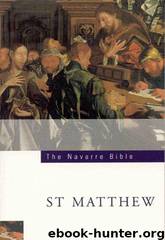The Navarre Bible: St. Matthew by University For Navarre

Author:University For Navarre [Navarre, University For]
Language: eng
Format: epub
Tags: NM, Religion, Christianity, Catholicism, Bible Commentary
ISBN: 9781851820580
Amazon: 1851820582
Publisher: Scepter Pubs
Published: 1991-01-02T05:00:00+00:00
j Other ancient authorities, after unchastity, read makes her Commit adultery.
k Other ancient authorities omit and he who marries a divorced woman Commits adultery.
l Other ancient authorities read manifold.
CHAPTER 20
The parable of the labourers in the vineyard
1-16 This parable is addressed to the Jewish people, whom God called at an early hour, centuries ago. Now the Gentiles are also being called — with an equal right to form part of the new people of God, the Church. In both cases it is a matter of a gratuitous, unmerited, invitation; therefore, those who were the “first” to receive the call have no grounds for complaining when God calls the “last” and gives them the same reward — membership of his people. At first sight the labourers of the first hour seem to have a genuine grievance — because they do not realize that to have a job in the Lord’s vineyard is a divine gift. Jesus leaves us in no doubt that although he calls us to follow different ways, all receive the same reward — heaven.
2 “Denarius”: a silver coin bearing an image of Caesar Augustus (Mt 22:19-21).
3 The Jewish method of calculating time was different from ours. They divided the whole day into eight parts, four night parts (called “watches”) and four day parts (called “hours”) — the first, third, sixth and ninth hour.
The first hour began at sunrise and ended around nine o’clock; the third ran to twelve noon; the sixth to three in the afternoon; and the fourth from three to sunset. This meant that the first and ninth hours varied in length, decreasing in autumn and winter and increasing in spring and summer and the reverse happening with the first and fourth watches.
Sometimes intermediate hours were counted — as for example in v. 6 which refers to the eleventh hour, the short period just before sunrise, the end of the working day.
16 The Vulgate, other translations and a good many Greek codexes add: “For many are called, but few are chosen” (cf. Mt 22:14).
Third prophecy of the Passion
18-19 Once again our Lord prophesies to his Apostles about his Death and Resurrection. The prospect of judging the world(cf. Mt 19:28) might have misled them into thinking in terms of an earthly messianic kingdom, an easy way ahead, leaving no room for the ignominy of the Cross.
Christ prepares their minds so that when the testing time comes they will remember that he prophesied his Passion and not be totally scandalized by it; he describes his Passion in some detail.
Referring to Holy Week, Monsignor Escrivá writes: “All the things brought to our mind by the different expressions of piety which characterize these days are of course directed to the Resurrection, which is, as St Paul says, the basis of our faith (cf. 1 Cor 15:14). But we should not tread this path too hastily, lest we lose sight of a very simple fact which we might easily overlook. We will not be able to share in our Lord’s Resurrection unless we unite ourselves with him in his Passion and Death.
Download
This site does not store any files on its server. We only index and link to content provided by other sites. Please contact the content providers to delete copyright contents if any and email us, we'll remove relevant links or contents immediately.
Resisting Happiness by Matthew Kelly(3335)
The Social Psychology of Inequality by Unknown(3013)
Day by Elie Wiesel(2778)
Designing Your Life by Bill Burnett(2734)
The Giving Tree by Shel Silverstein(2334)
Human Design by Chetan Parkyn(2066)
The Supreme Gift by Paulo Coelho(1957)
Angels of God: The Bible, the Church and the Heavenly Hosts by Mike Aquilina(1951)
Jesus of Nazareth by Joseph Ratzinger(1802)
Hostage to the Devil by Malachi Martin(1798)
Augustine: Conversions to Confessions by Robin Lane Fox(1765)
7 Secrets of Divine Mercy by Vinny Flynn(1730)
Dark Mysteries of the Vatican by H. Paul Jeffers(1704)
The Vatican Pimpernel by Brian Fleming(1696)
St. Thomas Aquinas by G. K. Chesterton(1628)
Saints & Angels by Doreen Virtue(1602)
The Ratline by Philippe Sands(1565)
My Daily Catholic Bible, NABRE by Thigpen Edited by Dr. Paul(1483)
Called to Life by Jacques Philippe(1473)
